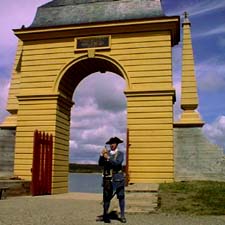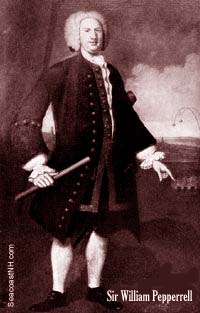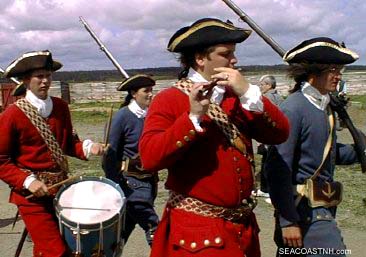|
FRESH STUFF DAILY |
|
|
||
|
|
||
|
|
||
|
SEE ALL SIGNED BOOKS by J. Dennis Robinson click here |
||
Page 1 of 3
We won. But can you name the first major military victory in American history? It made England rejoice, France despair and set the wheels in motion for an American Revolution three decades later. And it all started here.
READ: Great Myths of Canada
New Englanders from the Piscataqua region attacked Canada in 1745 -- and won. The largest colonial militia ever assembled in the New World to that date, 4,000 men, lay siege to the great walled French city at Louisbourg until the fortress fell. Thousands of French citizens who occupied the strategic port on what is now Cape Breton Island were shipped home to France. Nearly 1,000 New Englanders -- men of Maine, New Hampshire, Massachusetts, Rhode Island and Connecticut -- died at Louisbourg, most from exposure and disease, and their bones can still be found in the nearby Nova Scotia fields. Yet it's difficult to fathom the impact of the Louisbourg victory today. Life-sized full-length paintings of both winning generals loom over the reading room just inside ornate doors of the Portsmouth Athenaeum. On the left is a dully-dressed British admiral Sir Peter Warren. To his right, an oddly- shaped man with a bright red suit and Richard Simmons haircut commands attention. "Who is he?" visitors inevitably ask, looking up at the uniformed figure, bombs bursting in mid-air behind him. "That’s Sir William Pepperrell of Kittery, Maine," a learned guide will answer. "He won the siege at Louisbourg." "Uh-huh," the visitor says, and that's often the end of it. The battle that helped define colonial New England has all but passed from local memory.
The first problem with Louisbourg is geography. We defeated New France? Where was that? In Cape Breton? The second problem is alliance. First we were fighting the French and Indian Wars, then suddenly the French were our allies against the British in the American Revolution. Then we got mired in a Quasi-War with France. Go figure. The third problem is timing. In 1745 at the defeat of Louisbourg, New Englanders were British subjects, not yet full-fledged flag-waving American patriots. Maine was still part of Massachusetts and William Pepperrell (eventually the first colonial ever knighted by the British crown) was arguably the richest man in North America. Unassuming and likeable, Pepperrell was a successful merchant and judge. Heir to his father's fortune, native-born Pepperrell could walk from Kittery to Saco, Maine without ever stepping off his own land. But our national memory for heroes prior to the Revolution is short. Continue with FORT LOUISBOURG
Please visit these SeacoastNH.com ad partners.
News about Portsmouth from Fosters.com |
| Friday, April 19, 2024 |


|
Copyright ® 1996-2020 SeacoastNH.com. All rights reserved. Privacy Statement
Site maintained by ad-cetera graphics

 HISTORY
HISTORY




 The first major military victory in New Hampshire history is all but forgotten. We won for England in 1745. The French lost. The New England attack on Fort Louisbourg was lead by a Kittery general, the richest man around. A thousand Yankees were left behind, dead largely from disease and exposure. And New Englanders learned an important lesson – they could fight if called upon.
The first major military victory in New Hampshire history is all but forgotten. We won for England in 1745. The French lost. The New England attack on Fort Louisbourg was lead by a Kittery general, the richest man around. A thousand Yankees were left behind, dead largely from disease and exposure. And New Englanders learned an important lesson – they could fight if called upon.















